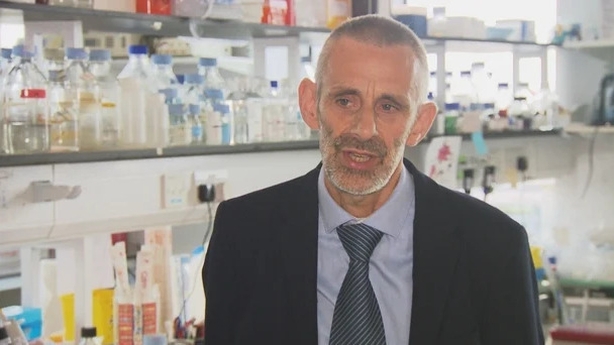A new study has found high levels of moderate to severe depression and concerning alcohol use in people with Long Covid.
The study involved 155 participants over 14 months and was conducted at the Mater Hospital's Long Covid Clinic in partnership with north Dublin GPs.
It found that psychological and psychiatric problems, such as anxiety and depression, are much more prevalent in Long Covid patients than in the general public.
Patients with no previous history of depression or anxiety prior to their Covid-19 infection are now presenting to the clinic with neurological conditions.
Almost one in five participants had moderate to severe depression one year on and almost three quarters had concerning alcohol use.

Professor Jack Lambert said that during the first wave of Covid-19, it was anticipated that the enduring complications of the infection would mainly be heart and lung issues, but the research has shown this is not the case.
The consultant in infectious diseases at the Mater Hospital and full clinical professor of medicine at the UCD School of Medicine called for more support to be rolled out in Ireland for Long Covid, including support for GPs.
Dr Brendan Kelly, an infectious diseases doctor at the Mater and one of the co-authors of the study, said that the findings raised significant concerns about the ongoing psychiatric symptoms and high levels of alcohol use among Long Covid populations.
Speaking on RTÉ's News at One, he said they were expecting to see more lung and heart conditions, but found high numbers of people with anxiety, depression and PTSD.
Dr Kelly said this shows that Long Covid is "more of a systemic issue with lots of facets to it" that need to be addressed.
He said 25% of patients in the clinic still have ongoing symptoms and their physical well-being is also affected.
Most of these patients did not have previous issues, he added.
"These are really significant findings that we need to address in this cohort, and I think it's going to become a much bigger issue as time goes by," he said.
Patients will likely need psychiatry, neurology and neuropsychology involvement in their treatment, he said and things that are "really lacking" at the moment.
"Even before Covid there was a huge lack of psychiatrists in the country, a huge lack of neurologists," he said.
"So it was very, very hard for us to get access to these services even before Covid, now it's even more problematic."
The research team says that Long Covid continues to affect a high proportion of people in Ireland, with a quarter of all patients presenting at the Covid-19 follow-up clinic at the Mater Hospital still suffering from symptoms a year after their initial infection.
The studies were funded by the Health Research Board and through the UCD Newman Fellowship programme.
We need your consent to load this rte-player contentWe use rte-player to manage extra content that can set cookies on your device and collect data about your activity. Please review their details and accept them to load the content.Manage Preferences
Dr O'Kelly told RTÉ’s Six One News that there will "probably be ongoing waves" of coronavirus "into the future".
He said that the positivity rate of the infection is increasing and recommended continued wearing of masks and people practising basic hygiene.
Covid case numbers 'still rumbling along'
Meanwhile, a Professor of Experimental Immunology at Trinity College Dublin has said Covid case numbers are "still rumbling along" while ICU numbers are rising slightly.
Speaking on RTÉ's Morning Ireland, Kingston Mills said that while it is not a "huge cause for concern", it must be remembered that the current variant of the virus is "very, very transmissible".
Those people who are fully vaccinated or have recently been infected are unlikely to suffer a serious illness, he added.

Professor Mills said the existing vaccines are effective at preventing severe infection, hospitalisation and death; but not very effective at preventing transmission.
He said that companies are testing Omicron specific vaccines but it takes some time to get regulatory approval for them.
Hopefully they will be available by the autumn, he said.
Prof Mills said that those over 65 and people who are vulnerable should get a fourth vaccine, but this is not essential for the majority of people.
"I think if somebody's had three doses of the vaccine and one infection which is probably a lot of the population than they have better immunity than a fourth dose of the vaccine would confer because you have to remember when you get infected you're getting infected with the circulating strain at the time," he added.
According to the official Covid-19 GeoHive DataHub, the number of Covid-19 deaths for the week to Sunday May 29 was 5. These are deaths with a date of death recorded during that week. Other data may show higher figures as it includes deaths from weeks, or months back.
— Fergal Bowers (@FergalBowers) June 7, 2022






